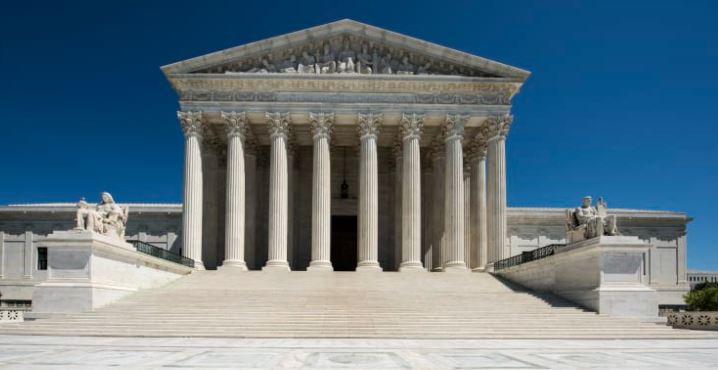The U.S. Supreme Court’s new term begins today, Oct. 4. Although only a few employment-related cases have been accepted so far, employment law attorneys will be following some key issues that could impact our workplaces.
“The current docket is very light on employment cases, but there are potentially significant petitions that we are monitoring closely,” said Stephanie Adler-Paindiris, an attorney with Jackson Lewis in Orlando, Fla.
Members of the public will be able to listen to live audio of oral arguments again this term—a practice that began in 2020 when the court closed to the public due to the COVID-19 pandemic. Although arguments will be heard in the courtroom this term, access will be strictly limited for now.
“Out of concern for the health and safety of the public and Supreme Court employees, the courtroom sessions will not be open to the public,” according to Patricia McCabe, public information officer for the court. “The court will continue to closely monitor public health guidance in determining plans.”
Here are the cases and potential issues employers and HR professionals should be watching.
Cases on the Docket:
Arbitration. In the upcoming term, the Supreme Court will hear Badgerow v. Walters, which involves a whistleblower claim and whether a federal court has the authority to confirm or vacate an arbitration award in the case when the only basis for federal jurisdiction is that the underlying dispute involved a federal question.
“The fact that the Supreme Court took an arbitration case … is important,” said Joe Beachboard, an attorney with Ogletree Deakins in Los Angeles. “It’s a very complicated case.” Essentially, it involves an employee who signed an arbitration agreement and is seeking to bring a whistleblower claim outside of the arbitration forum. Oral argument is scheduled for Nov. 2.
Employee benefits. The court will also hear an employee benefits case, Hughes v. Northwestern University, regarding a claim that plan participants were charged excessive fees and plan fiduciaries breached their duty of prudence under the Employee Retirement Income Security Act.
The participants claim that the university recommended a fund that had high fees and poor results, Beachboard explained. The lower courts rejected the claim, noting that the participants could have chosen to invest in other funds. Oral argument is scheduled for Dec. 6.
ACA disability discrimination. CVS Pharmacy Inc. v. Doe involves a disability discrimination claim under Section 504 of the Rehabilitation Act of 1973, and by extension, Section 1557 of the Patient Protection and Affordable Care Act (ACA). The high court was asked to decide whether the plaintiffs can bring a “disparate impact” claim for disability discrimination. “Disparate impact” means that a seemingly neutral policy is discriminatory in practice based on a protected category, such as disability.
The plaintiffs in this case are living with HIV/AIDS and obtain their medication through employer-sponsored health plans. Their prescription plans authorize “in-network” prices for specialized medication only if it is received by mail or picked up at a CVS pharmacy. The plaintiffs claim the policy forces them to “forego essential counseling and consultation from specialty pharmacists.” CVS argued that Section 504 “betrays no intent to create a private remedy for disparate impact discrimination” and “companies would face unacceptable uncertainty” if the court sides with the plaintiffs. Oral argument is set for Dec. 7.
Emotional distress awards. In Cummings v. Premier Rehab Keller, P.L.L.C., the high court was asked to weigh in on whether emotional distress damages are available in discrimination claims under Section 504 of the Rehabilitation Act and the Americans with Disabilities Act. Oral argument is set for Nov. 30.
Petitions to Watch
“Several pending petitions could have a significant impact on employers, but it’s unclear whether the court will hear those cases,” Adler-Paindiris noted. Potential issues include:
- Arbitration agreements with gig-economy workers and whether the Federal Arbitration Act (FAA) pre-empts the California Private Attorneys General Act.
- Affirmative action programs.
- Religion and First Amendment rights.
- Wage and hour laws.
- Discrimination claims.
- Labor union dues.
Adler-Paindiris said she’s following Gonzalez-Bermudez v. Abbott Laboratories, which asks whether an employee who brought an age discrimination claim could submit evidence of a “similarly situated” employee who did not share the same position, job duties and supervisor.
“The standard governing who is a valid comparator to be used to establish a prima facia case of any kind of discrimination is so elemental to what we do,” she said. “When the standard of who is ‘similar’ is constantly being moved, it is difficult for employers to accomplish the goal of a more equitable workplace.”
Although there are no cases on the docket regarding the following issues, Beachboard said these hot topics are on the horizon:
- Marijuana legalization and how drug-testing policies interact with laws that restrict employers from monitoring workers’ off-duty conduct.
- Religious discrimination and reasonable accommodations.
- COVID-19-related litigation regarding vaccine mandates, disability-related and religious accommodations, remote-work rules, wage and hour laws, and more.
We will continue to follow these and other cases as the Supreme Court takes them up, keep checking our blog for updated materials related to these and other cases.
